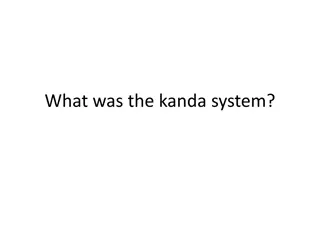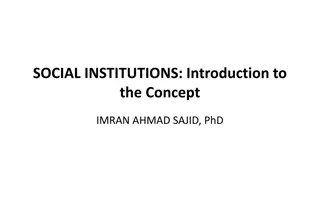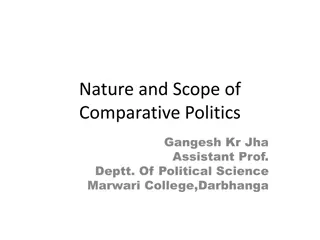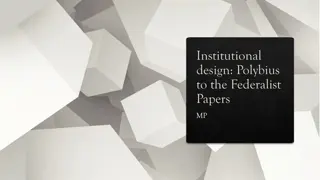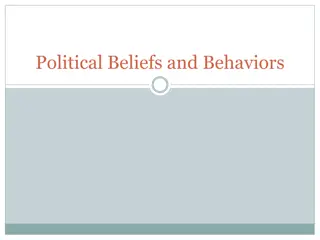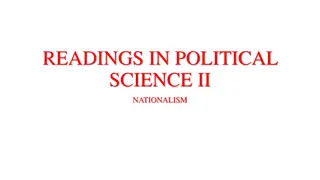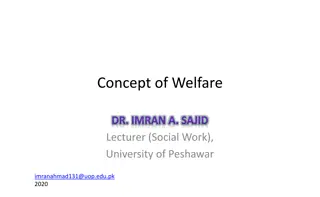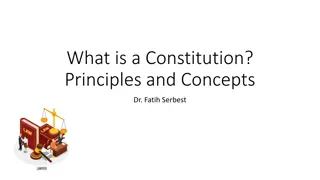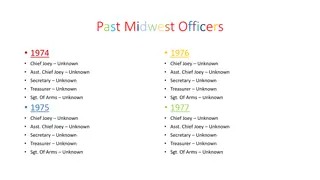Traditional Political Institutions and Chiefs
Defined as the institution of chieftaincy, chiefs in various communities hold crucial roles. Explore the legitimacy, selection process, and qualities of chiefs in traditional societies, along with their governance functions.
Download Presentation

Please find below an Image/Link to download the presentation.
The content on the website is provided AS IS for your information and personal use only. It may not be sold, licensed, or shared on other websites without obtaining consent from the author.If you encounter any issues during the download, it is possible that the publisher has removed the file from their server.
You are allowed to download the files provided on this website for personal or commercial use, subject to the condition that they are used lawfully. All files are the property of their respective owners.
The content on the website is provided AS IS for your information and personal use only. It may not be sold, licensed, or shared on other websites without obtaining consent from the author.
E N D
Presentation Transcript
Lecturer: Dr. R.E.V. GYAMPO, Department of Political Science College of Education School of Continuing and Distance Education 2014/2015 2016/2017
Traditional Political Institutions Defined By Traditional Political Institutions we refer to the institution of chieftaincy Chiefs play a crucial role in their various communities and areas of local jurisdictions. Before colonization, there were areas in West Africa referred to as acephalous societies. These societies had no chiefs with centralized authority. On the contrary, some of the societies have centralized authorities epitomized by the institution of chieftaincy Slide 2 Dr. R.E.V. GYAMPO, Dept of Political Science, UG
It is for example practiced in Britain while the Features of The Ideal-Type Bureacracy The Ideal-Type Bureaucracy has the following features Rational and Calculable Rules Impersonality Permanence Anonymity Neutrality Meritocracy Proper Filing system Slide 3 Dr. R.E.V. GYAMPO Dept of Political Science, UG .
Legitimacy of Chiefs There are various sources of legitimacy of chiefs. There include: Hereditary Conquest Descent Membership of a particular ruling family or Compensation or reward for bravery or distinguished service to the community Slide 4 Dr. R.E.V. GYAMPO Dept of Political Science, UG
Selection of Chiefs No one was born a chief. There are elaborate selection process in determining who must be the ruler of the people in the traditional setting Among the Akans for example, the traditional officials who play leading role in the selection of chiefs are the krontihene, gyaasehene and queen- mother After their selection, the chief is outdoored for public acceptance by the entire community Slide 5 Dr. R.E.V. GYAMPO Dept of Political Science, UG
Qualities of a Chief In selecting a chief, traditional officials look out for the following qualities: Humility Generosity Good character Good name and reputation Manliness Strong physique Slide 6 Dr. R.E.V. GYAMPO Dept of Political Science, UG
Functions of A Chief Governance, in charge of the day-today administration of the traditional community Settlement of disputes and ensuring justice Making bye laws and ensuring their enforcement Commander-in-chief of the local army Spiritual leadership Custodian of traditional norms, values, etc Slide 7 Dr. R.E.V. GYAMPO Dept of Political Science, UG
Restraints on the Powers of the Chief Deposition The Role of the Commoners Prohibition Against Holding Property The Role of the gods and ancestors Membership of Secret Society Revolt Desertion Slide 8 Dr. R.E.V. GYAMPO Dept of Political Science, UG
Image of a chief . Slide 9 Dr. R.E.V. GYAMPO Dept of Political Science, UG
The Role of Chiefs in Modern Times Slide 10 Dr. R.E.V. GYAMPO Dept of Political Science, UG
The Role of Chiefs in Modern Times (Cont) Even though some have argued that the institution of chieftaincy is anachronistic and irrelevant, it has been forcefully pointed out that chiefs are still relevant particularly in the rural hinterlands. In modern times, they can play the following roles: Poverty reduction, through the provision of short-term loans to people to do business Providing basic education for the rural child Increasing access to productive assets of the rural people such as land, capital etc Slide 11 Dr. Richard Boateng, UGBS
The Role of Chiefs in Modern Times (Cont) Encouraging popular participation in the development process Increasing the political, social and cultural choices of the people Making efforts to control population Growth Enhancing the health and nutritional status of their people Taking the initiative to control environmental degradation Paying particular attention to the problems of women in the rural areas. Slide 12 Dr. Richard Boateng, UGBS
Reading List Refer to Unit 2, pp. 24-39 of Poli 112 (Political Institutions) Modules Gyampo, R.E.V. The state of Political Institutions in Ghana, (Saarbrucken, Germany: Lambert Academic Publishing Inc. 2012) pp. 31-62 Slide 13 Dr. R.E.V. GYAMPO Dept of Political Science, UG
Concluding Remark THANK YOU R.E.V GYAMPO Slide 14 Dr. R.E.V. GYAMPO Dept of Political Science, UG












